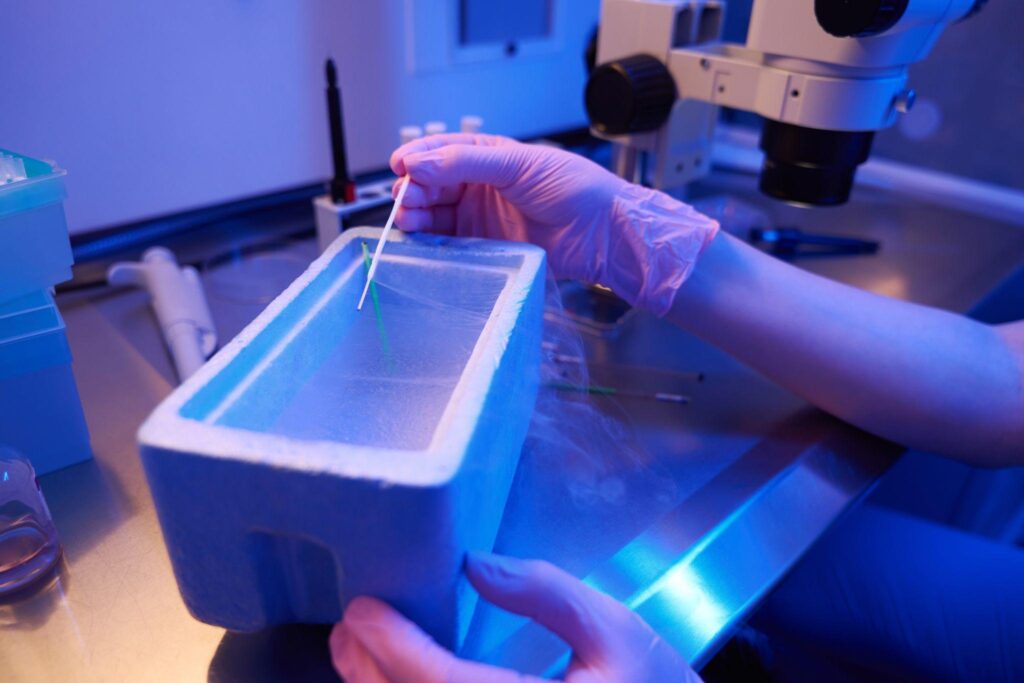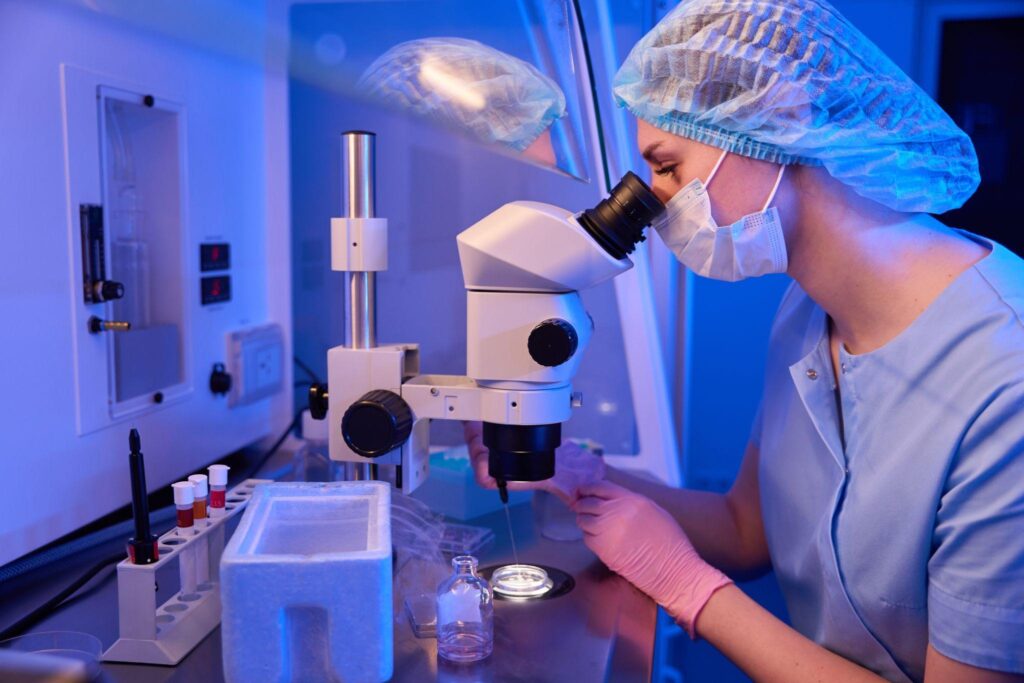You never thought you’d have to plan this part of your life. Maybe you imagined you’d be a mom by now; but things changed. You focused on your career, haven’t met the right partner, or maybe a medical condition disrupted your plans. Still, you want the option to have children someday. You’re not alone, and there’s a real solution: egg freezing.

At IVFLA Fertility in Murrieta, we specialize in helping women preserve their fertility through personalized, medically proven care. We’ll walk with you through each step of the process, from the first ultrasound to the day your eggs are retrieved. You deserve to understand your options and to feel confident in your future.
Why Choose IVFLA Fertility in Murrieta?
Led by Dr. Steven C. Presser, a board-certified fertility specialist with decades of experience, and Dr. Arjun Kadam, a leader in embryology, IVFLA combines advanced science with genuine compassion. Our Murrieta location offers access to the same high-quality care found at top centers across the country.
We offer weekend and evening appointments, fast response times, and transparent pricing to make this journey more manageable. Every part of the egg freezing cycle is handled by experts who understand the emotional and physical commitment it takes to freeze your eggs.
What Is Egg Freezing?
If you’re curious about how egg freezing works and what it entails, here’s a step-by-step breakdown of the process.
Understanding the Process
Egg freezing, also known as oocyte cryopreservation, involves stimulating your ovaries to produce multiple eggs, retrieving them, and then freezing the mature eggs for future use. The technique used today is called vitrification, a rapid-freezing method that prevents damaging ice crystals from forming inside the egg.
The process allows you to freeze your eggs while they’re still healthy. Later, when you’re ready, the eggs are thawed, fertilized with sperm, and the resulting embryos can be transferred into your uterus.
Who Should Consider Egg Freezing?
You might consider egg freezing if you:
- Have a medical condition like cancer that could impact your fertility
- Want children someday but aren’t ready now
- Have a family history of early menopause
- Are in your late 20s to mid-30s and want to preserve options for the future
According to the American Society for Reproductive Medicine, egg freezing is most successful when done at a younger age, ideally before 35.
The Step-by-Step Egg Freezing Process
Here’s what you can expect at each stage of the egg freezing journey, from your first consultation to safely storing your eggs for future use.
Step 1: Fertility Assessment
Your journey starts with a consultation and testing. We measure key hormone levels, including AMH, FSH, and Estradiol, and perform an ultrasound to count follicles in your ovaries. These results help us estimate the number of eggs we can expect to retrieve in one cycle.
We’ll also talk through your medical history, goals, and whether you may need one or more cycles to freeze enough mature eggs.
Step 2: Ovarian Stimulation
You’ll take fertility medications for 10–14 days to stimulate the ovaries to produce multiple eggs instead of the usual one per cycle. During this time, we’ll monitor you closely with bloodwork and ultrasounds every few days to track how your ovaries are responding.
Most patients tolerate this phase well, though some experience bloating, breast tenderness, or mood swings.
Step 3: Egg Retrieval Procedure
When your eggs have matured, you’ll receive a trigger shot that helps with final maturation. About 36 hours later, we perform the egg retrieval procedure at our Murrieta clinic.
You’ll be under light sedation for the 20–30 minute procedure. A fertility doctor uses ultrasound guidance to collect eggs from your ovaries using a thin needle. Most patients feel back to normal the next day.
Step 4: Freezing and Storage
Only mature eggs are frozen using vitrification. Once frozen, your eggs are stored in secure, temperature-controlled tanks with 24/7 monitoring. The eggs are frozen until you’re ready to use them; whether that’s in two years or ten.
Here’s a quick overview of the full process:
| Step | What Happens |
| 1. Assessment | Hormone tests + ultrasound |
| 2. Stimulation | Daily hormone injections |
| 3. Monitoring | Bloodwork + ultrasounds |
| 4. Retrieval | Outpatient egg collection |
| 5. Freezing | Vitrification and storage |
IVFLA’s Strengths: Technology and Heart
What truly sets our IVF services apart is the combination of advanced science with compassionate, personalized care. Here’s how we make that difference felt.
High Pregnancy Rates
Under the direction of Dr. Kadam, our IVF lab has achieved some of the highest pregnancy rates in the U.S. Every egg is handled with precision and care using the latest technology. We apply proven protocols used in reproductive medicine worldwide.
Personalized Care, Every Step
From your first call to your final visit, our team treats you with respect and empathy. We never rush you through appointments or leave questions unanswered. You’ll have access to fertility nurses, embryologists, and support staff who truly care about your success.
Whole-Person Fertility Support
We also offer complementary services like acupuncture, nutritional counseling, and stress management techniques to support your overall health during the process.
What Are the Risks and Side Effects?
Like any medical procedure, egg freezing comes with potential side effects and risks, though most are mild and manageable.
Mild Side Effects
Common effects of the egg freezing cycle include:
- Bloating and cramping
- Temporary weight gain
- Bruising or soreness at injection sites
- Fatigue after the retrieval
These usually resolve within a few days.
Rare Risks
Serious risks are very rare, but include:
- Ovarian Hyperstimulation Syndrome (OHSS)
- Ovarian torsion (twisting of the ovary)
- Infection or bleeding after retrieval
Our team works closely with you to adjust your medication and reduce these risks.
When Should You Freeze Your Eggs?
Timing plays a big role in the success of egg freezing, and understanding when and how many eggs to freeze can help you plan more confidently.
Ideal Timing
The best time to freeze eggs is in your late 20s to early 30s, when egg quality is highest. While it’s still possible after 35, success rates are typically lower because the number of healthy eggs declines with age.
How Many Eggs Should You Freeze?
We usually recommend freezing 15 to 20 mature eggs to have a good chance of achieving one healthy pregnancy. That may require more than one cycle, depending on your ovarian reserve.
Costs and Payment Options
Understanding the financial side of egg freezing is just as important as the medical side, and we’re here to help make it more manageable.
Typical Egg Freezing Costs
Here’s a general breakdown of egg freezing costs in California:
- One egg freezing cycle: $8,000–$15,000
- Medications: $3,000–$5,000
- Annual storage: $500–$1,000
The cost of freezing can vary widely depending on your clinic, response to meds, and storage length.
Payment Help at IVFLA
We offer:
- Payment plans
- Discounts for multi-cycle packages
- Access to clinical studies that may reduce costs
Our billing team will explain everything upfront, so there are no surprises.
Emotional Support Matters Too
Egg freezing can be an emotional journey, which is why caring for your mental and emotional well-being is an essential part of the process.
Mind-Body Care
Fertility treatment isn’t just physical. Stress can affect hormones and egg production. At IVFLA, we support your mental wellness with:
- Stress management tools
- Wellness coaching
- Nutrition consultations
Community and Coaching
You’ll also get help learning how to do injections, access to support groups, and constant communication with your care team.
What Happens When You’re Ready to Use Your Eggs?
When the time comes to grow your family, the next phase begins with thawing and fertilizing your eggs under expert care.
Thawing and Fertilization
When you decide to use your eggs, we thaw them, fertilize them with sperm using ICSI, and grow the resulting embryos. Then we transfer one or more embryos into your uterus during a carefully timed cycle.
Continued Support
Because IVFLA operates clinics in both Murrieta and Beverly Hills, your treatment continues smoothly no matter where you live. Our teams stay connected to ensure you receive the same high-quality care.
Frequently Asked Questions
1. What is the best age to freeze eggs?
Between 28 and 35 gives the best success rates.
2. How many eggs should I aim to freeze?
At least 15–20 mature eggs if possible.
3. Are there alternatives to egg freezing?
Yes. Embryo freezing and ovarian tissue preservation are other fertility preservation options.
4. Will egg freezing affect my natural cycle?
No. Your normal cycle returns shortly after the egg retrieval.
5. What happens if I never use my frozen eggs?
You can discard them, donate to research, or donate to another family.
Conclusion
Egg freezing isn’t just a procedure; it’s a way to preserve your chance at motherhood. At IVFLA Fertility in Murrieta, we help you take charge of your timeline with expert care, honest communication, and medical excellence.
If you’re thinking about egg freezing in Murrieta, let’s talk. Schedule a consultation and explore your best path forward. Give yourself more time and more options.

Dr. Steven C. Presser is a Beverly Hills fertility specialist with over three decades of experience, trained at USC, Cedars-Sinai, and UCLA. He is widely recognized for his research and publications in reproductive health, nutrition, and fertility preservation, and is fluent in English, Spanish, and Hebrew.



